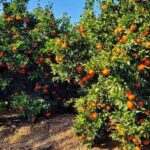AREFLH forum on European ag policies: Dialogue and collaboration mark the way for the future of the fresh produce industry

Press release
The first forum of the Assembly of European Horticultural Regions (AREFLH) took place on Wednesday, November 6 in Brussels. The event brought together regional representatives, industry professionals, and European institutions to discuss agricultural policies and sustainability ahead of the new five-year mandates of the European Parliament and European Commission. Supported by Pro Food – the product group of the Italian Federation of Rubber and Plastic Industries (Confindustria) representing Italy’s leading plastic food packaging manufacturers – the forum provided a platform for dialogue on the new challenges and opportunities facing the fresh produce industry.
The event featured prominent speakers, including Members of the European Parliament Herbert Dorfmann, Valérie Hayer, and Dario Nardella from the Committee on Agriculture and Rural Development, as well as Ricard Ramon from DG AGRI, with the discussion focused on agriculture’s role as a strategic sector for Europe. The speeches highlighted a shift in the European institutions’ approach, moving towards an open dialogue with farmers to develop “bottom-up” policies based on the sector’s real needs.
Among the main themes addressed during the sessions was the European Packaging and Packaging Waste Regulation (PPWR), adopted on April 24 and currently awaiting publication in the EU’s Official Journal. On the sustainability panel, moderated by Nicola Dall’Olio from the Italian region of Emilia-Romagna, taking part were Mariateresa Vivaldini (European Parliament, ITRE Committee), Jean-Luc Parou (Vice President of Idfel Val de Loire), Wim Rodenburg (Groeten Fruit Huis), and Roberto Zanichelli, a member of Pro Food’s communication committee and Unionplast Councillor. AREFLH members were unaminous in expressing their viewpoints: eliminating plastic packaging for fruit and vegetable products would not only severely impact the supply chain, but also lead to increased food waste, higher CO2 emissions, higher production costs and a decline in fruit and vegetable consumption.
In addressing forum participants, Mariateresa Vivaldini echoed the concerns of the packaging industry, emphasizing that packaging restrictions would be an excessive burden on the sector. She warned that imposing new regulations under the European Packaging and Packaging Waste Regulation risks heavily penalizing the industry and jeopardizing economic investments. “Sustainability should not be ideological; it must be balanced across its three pillars: environmental, economic, and social, because many families depend on this sector and agriculture is an essential part of the economy.”
Vivaldini stressed the importance of harmonizing regulations at the European level and requiring that third countries meet the same standards: “Rules must be equal for everyone; otherwise, we will be at a disadvantage compared to non-EU countries. We have worked hard to lessen the impact of these packaging restrictions and, while we regret not being able to fully protect the fruit and vegetable sector, there are still options at the regulatory level.” She continued, “We believe the effects will be more negative than anticipated, and we hope to obtain an early exemption for the fruit and vegetable sector, just as was done for wine. Banning plastic use where it is essential and minimal makes no sense; suitable materials and support for more rational use of water and fertilizers in agriculture are needed. Without sustainable alternatives, we risk importing from abroad, where pesticide and agrochemical use is less regulated.”
She concluded by stressing the importance of a pragmatic approach, suggesting exemptions for fruit and vegetables given the significant economic and production implications of the new regulations. “At the institutional level, I will do everything possible to secure these exemptions and continue working to ensure that the sector’s needs are considered in annual reviews.”
Jean-Luc Parou, Vice President of Idfel Val de Loire, discussed the impact of the French anti-waste law, which restricts plastic packaging for products under 1.5kg. Parou explained how this law has led to increased production and packaging costs, while simultaneously reducing the visual attractiveness of products and requiring significant investments in new machinery. “This law has impacted us directly and profoundly,” he stated, “with packaging costs doubling as well as negatively effecting consumers at a time when their purchasing power is lower.” While sharing the goal of reducing environmental impact, Parou pointed out that the law has had unexpected consequences, ultimately discouraging fruit and vegetable consumption: “Instead of encouraging more sustainable choices, the law has made fresh produce less accessible, resulting in a drop in sales. An overly rigid approach to sustainability risks undermining the effectiveness of environmental policies, penalizing both producers and consumers.”
Wim Rodenburg, representing Dutch producers of Groeten Fruit Huis, highlighted the need for a harmonized European regulation and the avoidance of national exemption lists for products requiring packaging for the purposes of hygiene and preservation. He emphasized the importance of packaging in ensuring product freshness and longevity, especially in relation to distant markets, explaining that the sector depends on these practices to maintain product quality during transport.
“Without a common European list, we risk ending up with different rules in every country, creating a significant disadvantage for those operating in multiple markets,” said Rodenburg. He then urged industry organizations to participate actively in European discussions, adding, “Only with a united voice can we ensure that regulations genuinely meet the sector’s needs, supporting a balance between sustainability and practicality.”
Pro Food – representing over 70% of Italy's plastic food container production, with 14 companies and 29 manufacturing plants – reiterated that plastic packaging is essential for ensuring food safety and reducing waste. In this context, Roberto Zanichelli, spokesman for Pro Food, highlighted how around 50% of fruit and vegetables in Europe are already sold loose, with plastic packaging for fresh produce accounting for only 1.5% of all food packaging. Nevertheless, the PPWR disproportionately penalizes this sector (Art. 25, Annex V), which is already a model of responsible packaging use. He explained how many fruit and vegetable packaging solutions already contain up to 70% recycled material, thus contributing to the European circular economy. “Eliminating these packaging products is paradoxically going to increase food waste and will reduce fruit and vegetable consumption, contradicting the EU’s goals,” he emphasized.
Through its participation in this forum, Pro Food reaffirmed its role as a leader in the transition towards a sustainable fruit and vegetable supply chain, promoting innovative solutions that balance environmental, production and economic needs as well as ensuring the competitiveness and safety of the entire fresh produce industry.














































